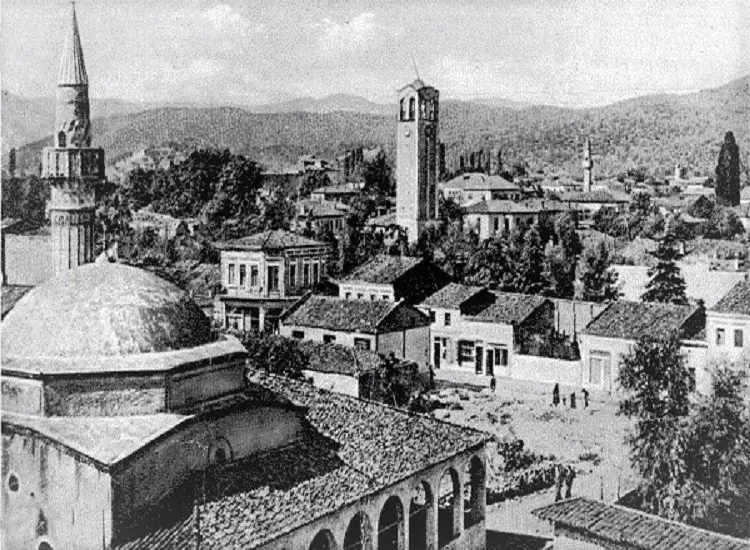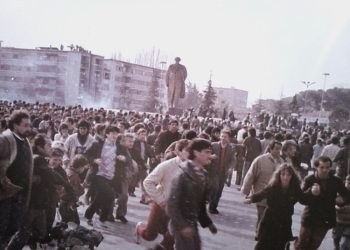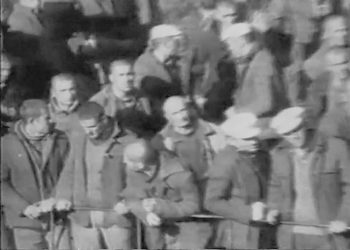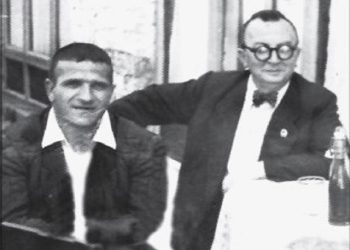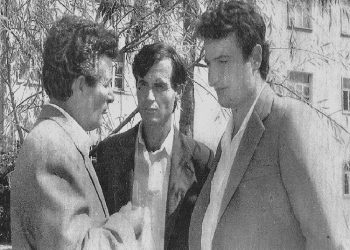Memorie.al / The Kongoli family, or as it is otherwise known, Kooli, got this surname as a result of a plant that grew in its fields, many centuries ago. According to the family history, it turns out that the first two sons who are remembered by name, were Berbers. Ali, one of them is Adhurimi’s grandfather, one of the well-known mathematics teachers in Elbasan. Worship shows that his family preserves many stories from the beginning of the 20th century until today. Due to some circumstances, this family was divided into two parts, engaged in the National Liberation Movement and non-engaged. A part was persecuted, while the rest was supported by the communist regime. But even the latter would not escape persecution, a few years later. From this family came Abdyl Kongoli, the creator of the first private company in Albania, the SAIDE tobacco company, the well-known composer Baki Kongoli and finally the famous writer, Fatos Kongoli. This family has produced teachers and engineers.
Family history
Adhurim Kongoli, Abdyl’s son, shows the roots of the family and the continuation with the vicissitudes that followed them. As Adhurimi tells us, the two brothers, Ali and Mahmut Kooli, were barbers. Mahmut had two children, Sabriu and a daughter, Bizdan. Sabriu followed the family tradition as a barber, while his daughter, Bizhdani, married Mustafa Demir. Meanwhile, Sabriu had two children, who became gendarmes.
“My grandfather Ali was married twice; with the first wife he had two children: Xhaferri and Abdyli, while with the second wife, Musa, Baki and two daughters, Dije and Bukuri. Xhaferri and Abdyli received scholarships to study in Turkey, the first as a doctor and the second as an officer. Abdyli graduated from the military academy in 1912 and was assigned to an artillery unit, with the rank of first captain.
Afterwards, he was appointed deputy commander of the first Albanian military units, where the commander was Kamo Sejdini. In 1915, Abdyli married a girl from the Salibasha tribe and left the castle house to his brothers.
After serving in Gjirokastër, Vlorë and Fier, he decides to return to Elbasan, after being appointed as commander of the Gendarmerie. At the time of Haxhi Qamili’s uprising, he was arrested by their forces, but since he was the only educated artilleryman, he was pardoned and sent to Shijak’s front. Like many patriots from Elbasan, he too was an opponent of the rebel uprising, led by Haxhi Qamili.
Such a fact is reflected in the volume “Historical Documents” collected by Lef Nosi, published in No. 8 of 1924. Abdyli also participated in what is known in history as the “June 1924 Revolution”. Something which, according to Adoration, – is also evidenced by his escape to Italy, immediately after the failure of that revolution.
Abdyl Kooli immigrated as a political emigrant, and such a fact is evidenced in two letters of the democrat Ahmet Dakli, while he was in emigration. These facts were confirmed by Liman Varoshi, when he was the director of the Elbasan Museum.
Abdyli, commanded the anti-Zogist forces during the attack to overthrow Zog in 1924. With the arrest of Noli, he escaped to Italy, together with his family and children: Fatri, Kujtim, Gazmendi and Adhurim. When the King announced an amnesty, Abdyli returned, but upon his return, he no longer engaged in politics or the army.
Abdyli founded the first Albanian company with shareholders
During his escape in Italy, Abdyl Kooli learns how joint stock companies could work and how they could constitute a successful business at the beginning of the 20th century. It was precisely this experience that served the father of four children when he returned to Elbasan. He thought well that tobacco could be very profitable, since it was a plant whose cultivation was very widespread in that area.
Abdyli no longer engaged in politics and never returned to his profession, but took the first step towards a successful business, the first anonymous tobacco production company with many shareholders in Elbasan.
Abdyl Kongoli gathered the traders, explained his idea and convinced them to contribute as shareholders. After that, the land where the factory will be built was also bought. Meanwhile, Ahmet Burburia was sent to Germany to buy the necessary equipment and machinery, while Qazim Xhepa was the treasurer of the private company.
SAIDE (Anonymous Industrial Society of Tobacco Elbasan) was established in 1927. This society, the first of its kind in Elbasan, was also the first in Albania, which operated in the field of tobacco and cigarette industry.
In the year of establishment, the initial capital was 240 thousand gold francs. Initially, there were 20 workers, while at the end of the 30s, it reached 50 workers. SAIDE maintained close ties with the producers and traders of Elbasan, from whom it obtained the raw material.
These connections are also evidenced in a document of a meeting of the Chamber of Commerce of Elbasan, held in 1935, where the leaders of SAIDE, Abdyl Kongoli, Beqir Rusi, as well as a group of traders and producers of tobacco from Elbasan participated.
In the first balance sheet of the factory, in 1928, it was profitable and the first shareholders were rewarded, attracting other interested parties to become part of it. The chairman of the factory council was Nazmi Baholli, while the union chairman was Qemal Hoxha.
Abdyl Kongoli, ran that manufacturing joint-stock company until 1947, when the factory was nationalized and then closed to become a Culture House. The building has been standing until recently, but due to depreciation and widening of the road, it collapsed.
Persecution of Abdyl, by the communist regime
Immediately after the closure of SAIDE, Abdyl Kongoli is sent to forced labor in Fushë-Buall, but it doesn’t take long and he is arrested by the State Security. After spending four months in the interrogator’s office, his trial took place on New Year’s Eve, at the end of 1947, beginning of 1948.
Worship confesses that his father faced the most terrible tortures and when he realized that there was no escape, he told his torturers that he had some documents at home. Such a statement served as an excuse to meet the children for the last time. “Accompanied by the policemen, he comes home and while messing around, he meets the children one by one. That would be the last time we would see him,” says Adhurimi.
– “He was not engaged, but he did not like communism. They brought some absurd charges against him and sentenced him to life imprisonment. Everything was confiscated from us, even our body clothing,” recalls Adhurimi. Meanwhile, Abdyli was sent to serve his sentence in Maliqi’s camp in 1950, and sometime between February 6-7 of the same year, he died, as he also suffered from tension. Meanwhile, the family ended up in complete poverty. Abdyl’s three sons go to Tirana, where, with many vicissitudes, they were able to continue the Pedagogical school.
The family after Abdyl’s exile!
Adhurim Kongoli, says that it was difficult for them after the death of their father. He says that, although he asked to continue his higher studies, his right was denied, but he was sent to teach in Burrel, in the years 1952-1955 and in 1955, in Krujë where he taught for 6 years and then in Mamurras, in Thumana and Derven, Kruja district. Only when Albania broke with the Soviet Union, Adhurima got the right to study at the Pedagogical Institute in Shkodër, which at that time was only for two years.
After graduation, he stayed in Shkodër after being appointed as a teacher at the Pedagogical High School, where he served for 5 years. Then he returned to Elbasan, first to Labinot e, then to Cërrik where he stayed for 20 years in a row. He was ranked among the best mathematics teachers, meanwhile, his brother, Fatriu, finished his higher studies in Tirana in the Industrial Chemistry branch, where with a scrupulous work, he managed to discover the simple formula of matches.
While Gazmendi graduated in Language and Literature, while Kujtimi was a teacher in Tropoja, but he was sick and stayed in the hospital for a long time.
Worship, he loved and served with great passion in the field of education. He was not only a very good math teacher, but for 20 years, he was also a very good English teacher. Those two boys: Admirim Kongolin, (Mechanical Engineer), who for some time also served as General Secretary of Elbasan Prefecture, and Andin, who graduated from the Higher Institute of Physical Culture “Vojo Kushi” in Tirana.
Meanwhile, Adhurimi’s wife, Bardhoshja, has served both in preschool education and as an educator, throughout her years of work, with a great dedication, which the people of Elbasan have as a tradition, since the period of the “Normal” School.
Baki Kongoli, the famous composer
Baki Kongoli, one of the well-known Albanian composers, grew up and was educated in an Albanian family with patriotic traditions. After finishing the “Normal” School, he starts working as a teacher, teaching in the district of Fier. During the period of the ‘Normal’ school, he learned the violin and music returned to his dream, leading to the fact that in 1937, he graduated from the Conservatory of Pavio, in Turin, for the violin.
In addition, he takes lessons in composition, orchestration and art history. After completing his studies, he returned to his homeland and was appointed a teacher at the ‘Normal’ School for the subject of music. Based on this, he set up and conducted the well-known violin and mandolin orchestra, with students from that school.
With the fascist occupation of the country, Baki Kongoli became associated with the National Liberation Movement and in 1943, became a partisan. During a German curfew, while Bakiu was in his house in Kala, together with Musa, (his brother), he told the latter to stay and take care of the women of the family, while he himself fled, but from the control of the Germans in on the roof of the house, a bag of tracts was found.
Based on this, Musa was arrested and deported to the German Nazi camps, in Mathauzen, from where he never returned, as he disappeared without a trace! Baki Kongoli, after the liberation, returned as a teacher in “Normale” and then moved to Tirana, where he was appointed to several important jobs.
Bakiu is known as the author of many musical creations, such as: the operetta “Vajza e Portokalleve”, performed on the stage of the city of Elbasan, “Albanian Tango”, etc. In 1956, he was elected secretary of the League of Writers and Artists of Albania. During those years, he made a name for himself as a composer, especially in light music, but he was also a good connoisseur of civic folklore.
In 1967, Bakiu was appointed deputy director of the Institute of Popular Culture, a task he performed with great passion and dedication, until 1974, when he retired.
He had connections with all the most vocal musicians of that time, as was the case with Tefta Tashko, with whom he corresponded, and helped him a lot, with popular source songs. In the field of musical composition, Baki Kongoli is the author of about 200 songs and two operettas.
Bakiu also gave a great help in the establishment of the first Albanian musical institutions, such as: the Philharmonic, the Opera and Ballet Theatre, the State Conservatory, etc. In 1974, after the arrest of the Minister of People’s Defense, Beqir Balluku, with whom he was friends, Baki Kongoli was expelled from the party and the leadership positions he held. Bakiu has three sons, Fatos, Roland and Artan. Fatosi and Rolandi studied mathematics and physics, while Artani studied economics
Xhaferr Kongoli “Martyr” of the War
Xhaferr Kongoli, “Martyr” of the National Liberation War, was one of the well-known doctors of Elbasan. The hospital center of Elbasan and a nine-year school bear his name today. Even Xhaferr Kongoli would go through the “Normal” gangs and then he went to Istanbul to continue his higher studies at the Faculty of Medicine.
After graduating in Istanbul, Xhaferri returned to his homeland, starting work as a doctor in Elbasan. He participated in the June Movement in 1924, for which he was imprisoned. Until 1929, Xhaferri worked as a doctor in Berat in the Zaloshnja family and then, with the end of the Italian-Greek War, he moved to Elbasan.
Xhaferri was engaged in the National Liberation Movement and was elected chairman of the National Liberation Council for Elbasan. He worked with great dedication, sheltering and treating wounded partisans. In 1943, for his anti-fascist activity, he was exiled to Porto-Romano, where he stayed until the capitulation of fascist Italy. At the end of November 1943, he was arrested by the Germans and shot by the Gestapo forces. Xhaferri left four children: Destar, Ali, Angel and Pranvera, who all graduated from high schools.
Fatos Kongoli is proposed for honorary citizen
The well-known writer Fatos Kongoli, son of Baki Kongoli, has recently been honored with the highest title awarded in France, “Knight of the Legion of Honor”, an award granted by the French President, Nicolas Sarkozy.
Through translations by Edmond Tupja, Kongol’s works, such as: “The Lost”, “Corpse”, “The Ivory Dragon”, “The Dream of Damocles”, “The Skin of the Dog”, “At the Gate of Saint Peter”, “The Shadow of the other”, are known in France and other countries.
“I would call it a story of silent adoration, at a distance,” said Kongoli, during his speech, upon receiving this honorary title (the Legion of Honor is the highest decoration awarded in France. It was created by Napoleon Bonaparte in May of 1802 and for the first time it was given on June 15 of 1804). Fatos Kongoli, (born in 1944), is known as one of the main and representative figures of contemporary Albanian literature. Kongoli first lived in Elbasan and studied mathematics in the People’s Republic of China. As the writer himself says, “The Three of Us” is his first novel.
“I started writing it at the end of 1983; finished it at the end of 1984, and it was published in the middle of 1985. I remember that, since it was published, it had a good circulation for that time. The book it was received very well and within a few months, it disappeared from circulation, to be republished only in recent years”, says Kongoli.
Meanwhile, his first novel, entitled “I humburi” (Tirana, 1992) describes the events of March 1991, when almost 10,000 Albanian refugees headed to the shores of the sea ports of the Adriatic and Ionian seas, to leave Albania of that time. One of Fatos Kongoli’s novels is “Bolero in the Elderly Home”, a book that has been well liked and has been praised by literary critics.
Some time ago, the former Prefect of Elbasan, Dr. Shefqet Deliallisi has proposed to the Municipal Council to award the title of “Honorary Citizen” to the well-known writer from Elbasan, Fatos Kongoli, where, among other things, he writes: “Being convinced that I share with you the same opinion and appreciation for the work, the work and the figure of the international writer from Elbasan, Fatos Kongoli, I propose that in one of your meetings you consider the award with the title of Honorary Citizen of Elbasan. I think that this evaluation would be in our honor and the citizens we represent, since Mr. Kongoli, represent the city’s citizenship and culture in a national and international level,” says Deliallisi in his proposal.
That thing became a reality on April 14, 2010, when the former mayor of the Municipality of Elbasan, Mr. Qazim Sejdini, in a ceremony attended by many intellectuals from Elbasan, handed Mr. Kongoli, title “Honorary Citizen of Elbasan”. In his short speech, the well-known writer said: “I received many awards that were moments of joy for me; I was pleased that my books were published and appreciated outside of Albania. But the satisfaction and emotion I feel today in Elbasan with the title “Citizen of Honor” is incomparable”. Memorie.al




